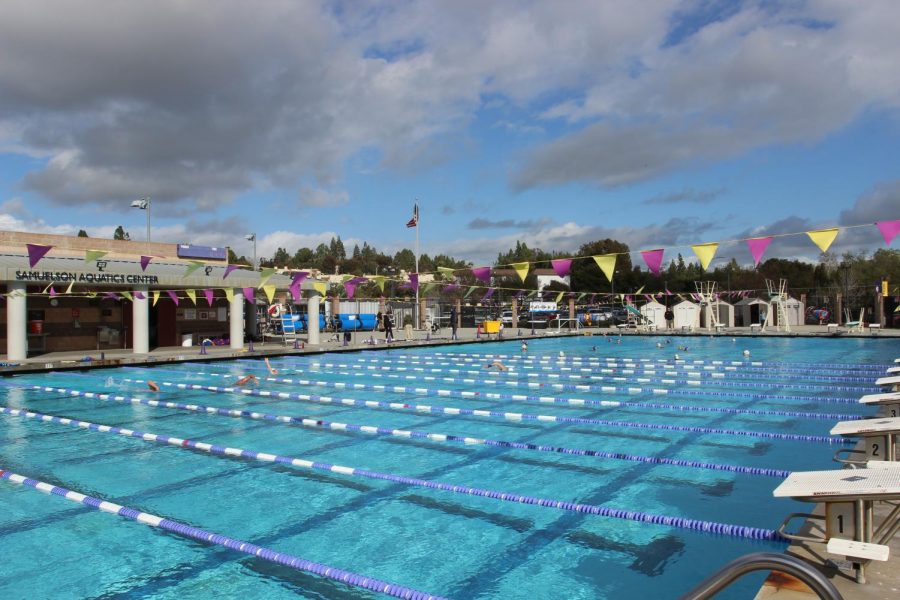Offseason practice with coach is essential for swim
Photo by Marcel Hurtubise – Reporter
The Division III rule also prevents swimmers from being able to easily find pool time to train.
March 28, 2023
Training, for any serious athlete, should never end with the season, and anyone who wants to hit the next season in a better spot needs to train in the offseason. However, the National Collegiate Athletic Association rules for Division III state that any swim and dive practices in the offseason cannot be anything but “voluntary” practices.
To count as a “voluntary” practice, it must follow a few different rules: the student-athlete must not be required to report back to a coach, the activity must be initiated solely by the student-athlete and not by the coaching staff or athletic department and the activity must not be recorded for attendance or performance sake. Another aspect is that the student-athlete is not subject to any penalty if they do not want to participate in the activity.
While most of this sounds good, it would be a lot to expect a student-athlete to continue mandatory training during the offseason, especially because of the lack of coach involvement in the training due to the NCAA rules for DIII schools. A sport like swimming requires someone to write specific practice exercises and to help structure practices, which is a job better done by a coach out of the water. It is hard to train effectively when you also are having to plan the training, along with the fact that not everyone is knowledgeable about how to make sets.
Swimming is not a sport that one can drop during the whole summer and expect to improve in, nor is it even a sport that you can half-train during the offseason. It requires a year-round dedication of multiple hours in the pool a day to truly become a better athlete. This becomes incredibly hard when there is no structured training regimen given to you by a coach.
Another issue, specifically for swimming, many people only have their club teams to turn to for offseason. This is already a huge gamble on whether or not they are able to train with that club team at all, as many club swim teams are also mostly made up of younger swimmers from the ages of 12-16, which can be awkward for a college student.
One solution is the change from week-based practices to day-based practices. Normally, a team is given an allotted amount of weeks to practice per-season, however, the NCAA is looking into changing to counting days instead.
“There was talk about, instead of counting weeks, giving a certain amount of days in the year that you could work out as a team,” Head Softball Coach Debby Day said.
This would give more flexibility with training across all sports as it is. Day said that normally, even if a single day out of the week is used for practice, that whole week is taken up as one of their finite practice weeks.
This would certainly help add more days of the preseason that a coach could be on deck, as well as during the offseason to continue coaching the team for a little while longer. However, this does not fully solve the issue of training because it would still not allow athletes to train with their coach during the summer.
Another solution to changing the rule is going through our university’s Student-Athlete Advisory Committee. The SAAC is a committee of student-athletes that can offer input on rules and policies. Each athletics team has a representative that is able to take the complaint higher up the chain.
“It comes down to your sport’s SAAC representative because we’re the ones who can propose that legislation and vote on it,” Men’s Swim and Dive SAAC Representative Ethan Smith said.
In DII, there is a rule that you can have summer practices with your coach if it is initiated by the student-athlete, so it would not be a far cry to ask for the same treatment in DIII. I think that with more awareness of the ability to change this rule, there is a greater chance that the steps to change it will actually be taken. A rule similar to the DII rule would be a perfect fit as it would eliminate any fear of overtraining that the original rule seems to want to prevent.
In an article published in SwimSwam entitled “D3 Swimming is not a Seasonal Sport,” Peter Robinson said that it is ultimately up to the athlete to have the will to train during the offseason during this ruling by the NCAA.
“If you’re truly serious about your goals in swimming, there is absolutely no way you can take six months off and still expect to achieve them,” Robinson said. “If you’re serious enough about your goals, this ‘offseason’ simply does not exist.”




















